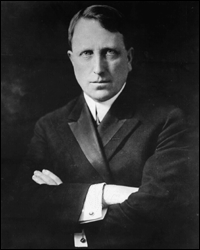The tidy lines of journalism are blurred.
A once black and white industry printed without room for rebuttal now lays at the crossroads of content creation and marketing madness. Journalists cannot seem to find sufficient pay for work. Stories get disregarded. How did this happen?
It is not as closely linked to our recent boom in digital media as you might think. In fact, the journalism industry faced its first game-changing challenge with marketers in 1899.
Two men held the reigns of American journalism in the late 19th century, and they led their respective troops in opposite directions.

Joseph Pulitzer of the New York World guided his hunch for news with a strict system of integrity. He coveted the authentic, accurate storytelling upon which American journalism had built itself. His rival and fellow journalistic troop leader, William Randolph Hearst of the New York Journal, was following a different set of hunches.
Hearst and his limitless budget were in the game to make his paper rise to the top of the market and be the only paper to which the public needed to pay notice. He enticed Pulitzer’s writers with generous salaries; he dropped the price of his paper to competitively weaken the New York World; stories ran before sources and plot details were confirmed beyond doubt. Pulitzer tried to hold tight to his idealistic vision of journalism, but let down his guard more and more often as the two publications raced for readership. 
Cue the Spanish-American War and America’s obsession with it. Funds are poured into both publications so irresponsibly to win favoritism amongst the public; the only conceivable budget fix is to raise the price for and distribution demands of newsboys. It didn’t take long for a group of the impoverished young workers – 5,000 of them, actually- to ban together and go on strike against the new expectations. Protests in the Brooklyn Bridge drew attention to one of the most prevalent affairs in journalism and child labor.
Circulation came to a screeching halt. The boys refused to budge until their demands were met- and they were. Within two weeks, both the World and the Journal paid their debts and Pulitzer, and Hearst were left with an unavoidable revelation: without marketing, there is no media.
Today, journalism and content marketing sit at the same opposing chairs that Pulitzer and Hearst once did.
And again, both stare at a centerpiece on the table that reminds both that without a savvy marketing strategy, a story is but words in a diary.
Every story needs a rep. Ideally, every story needs a task force of reps whose mission is to bring that story to as many people as possible. But there is this notion of opposition so heavy in the air above that table. Journalism wants nothing to do with the inauthentic tactics of content marketers to reach more audiences. Content marketers don’t fully understand that the stubborn passion with which journalists pen their pages is the soul of writing that keeps readers wanting to digest more.
Journalism and content marketing are at the same table.

They’re in the same business, and they need to be working together. Journalists need the insight of digital marketing experts, and content creation companies need the writing and research expertise of journalists.
We are beyond embracing the idea that both sides of the table can help each other rise to the top. Journalists and content marketers need to work together to keep reporting and storytelling alive. Journalists need to adopt a thorough understanding of media distribution, how to reach audiences, when to push content, at what precise moment to make a story go viral.
Content marketers need to take writing seriously.
Research precedes concept and story override word count criteria.
Content marketing is well readied for the entertainment-driven media and news consumption we live amidst today. Marketing geniuses know exactly when to throw a story to the public. Through which mediums their audiences will most quickly digest it. When to supplement a piece with other platforms. Where to take the lifeline of a tale.
Today, stories never die. They’re recycled, retweeted, repeated and referenced six months down the line.
Content marketing continues to evolve in the cleverest ways, and it puts them at an unbeatable advantage for content absorption. Once you master who to reach, when and where, the how to reach an audience opens itself up to an Infinitum of innovative possibilities.
But there’s still one element missing. The why.
Why are you reaching out to your audience? Why do you want to bring them a story? It can’t be limited to delivering content that drives sales. What feeds your consumer? What makes them excited about the world? Develop an interest in a new subject? Why can’t you be that source that brings them everything they need to know and imagine about life? You can! Enter the journalist.
A journalist understands a reader in a way that a content marketer does not. Journalists speak heart to heart. They know the clues in a story that paint a picture for a reader and to which takeaway a reader will connect. A journalist finds the story within the story; the one that grips the reader and gives them the purpose for learning about a worldly event greater than staying in the know.
By adopting a collaborative mentality, journalists and content marketers can take the world by storm, keeping the masses well-educated and well-entertained. Journalists have started to straddle both news and brand sides of content, better equipping the incoming generations of writers to report with a marketing instinct.
It isn’t selling out. It’s linking up and making selling possible so that we can ensure that shrewd reporting and storytelling never die.










